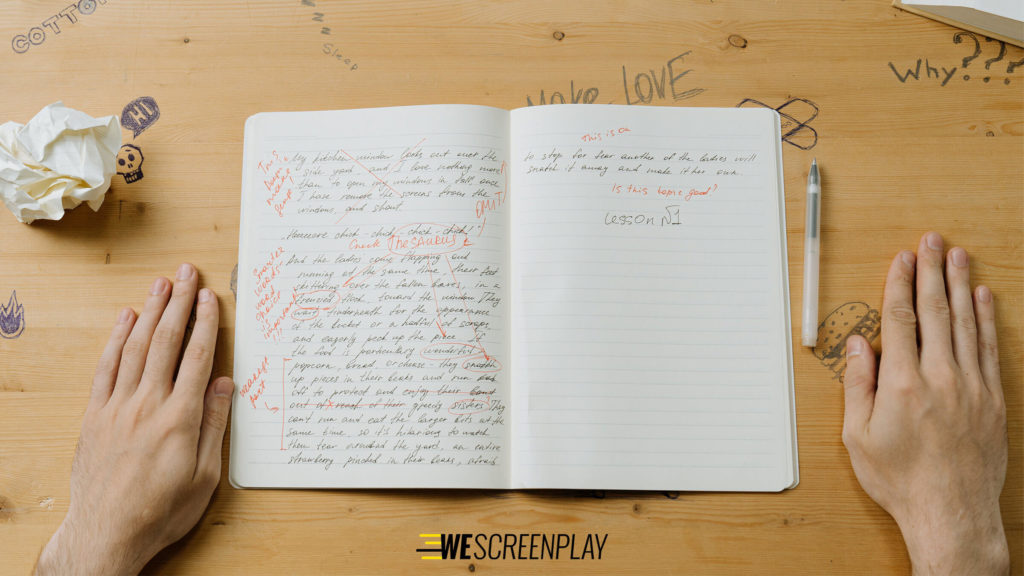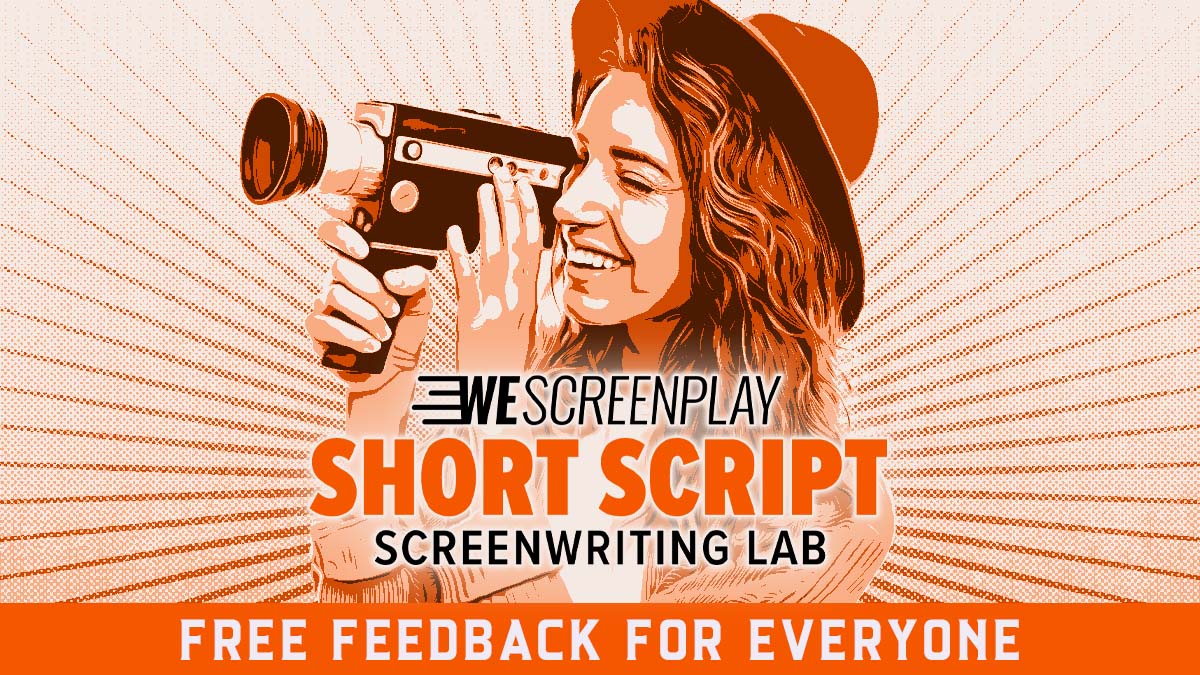
We all know the feeling — you’ve sent your screenplay to get someone’s thoughts on it and the day has finally come. The reply email has landed in your inbox! This is it, the notes you’ve been eagerly waiting for, the script coverage with the feedback that will illuminate the rewrite path before you to help you polish the screenplay you’ve worked so hard on.
You settle in with a cuppa at your computer, heart beating fast as you click on the email, mind racing with all the possibilities that could be contained within. Did they like it? Did they hate it? Will they say the parts you love are indeed great and they’re loving it as much as you? Will your script be torn limb from limb, and you’ll have to start all over from a page one rewrite??
Stop right there, my writer friend. You’re gallivanting in the oft-visited in-your-head imaginary screenwriter land that drives screenwriters crazy. You need to ground yourself in a place where you can receive feedback as the pro screenwriter that you are.
Reading this column is already part of that process. Congrats to you for taking the time to educate yourself on how to navigate feedback as a screenwriter! It’s a skill all of us must learn to be successful in screenwriting, because the reality is that you could receive nonsensical or even offensive notes at times. It’s about how to not take it personally and forge ahead as a writer.
Notes From the Perspective of a Reader/Screenwriter
A little background on me — I was a script reader for nearly a decade, working in development and acquisitions. I’ve read for just about everything: producers, production companies, literary management, contests, directors, major film markets, distribution, etc. I trained other readers in story analysis and helped them offer more effective coverage.
That experience unwittingly helped me learn how to receive notes on my own writing. I hope to pass on some of that knowledge to you so you can sharpen your screenwriting game by knowing how to navigate feedback as a screenwriter. Read on for a few tips.
Know Who Your Reader Is
If there is only one thing you take away from reading this, it’s this: know who is giving you feedback. Get totally clear on the source of the notes or the person that actually wrote the script coverage you’re receiving. Who is the reader, what’s their background, and what experience do they have in the industry?
Did you enter a contest, and the notes are from a faceless contest reader? Did you send your script to a manager with feature-producing experience? Are the notes from your screenwriting friend that’s been an actor but doesn’t have much experience on the writing side? Did you hire a script reader currently working in development at a studio to give you coverage?
Readers have such a wide range of backgrounds and experiences that there is no way to detail it all within this section. Watch this Facebook Live I hosted in my Tea with Ke video series that goes in-depth about script readers — what they do, what qualifies them, the difference between a reader and a consultant, and more.

Knowing the industry expertise your reader brings with them is paramount to understanding which notes you may want to pay more attention to and which the reader may not be as strong in offering. Feedback from a general contest reader who may not be getting paid and doing the gig for experience may not carry as much weight as a former studio exec that’s been enlisted to find the top scripts for a contest.
It’s also valuable to know the personal perspective your reader is coming from. Here’s an example from feedback I’ve received as a screenwriter. I tend to write scripts with mixed-race characters because that’s my personal background and the kind of stories I feel we need more of in the world. I received feedback from a screenwriter that included a note that the racism in one of my scripts isn’t believable.
But who was my reader? They’re white and have not had the same experiences with racism as a person of color. I knew I could put that note to the side.
You may not always know the gender, race, or personal perspective of the reader. Just keep in mind that everyone can only offer from their own experience. Notes in regard to race, religion, women, LGBTQ+, disabilities, and other historically under-represented or often misunderstood groups should be taken with a grain of salt, especially if it’s something you feel strongly about because of your personal experience.
Clarify Or Disregard Flowery Language
“Flowery language” in coverage is one of my pet peeves. When I worked as a script reader, I hated seeing other readers giving these kinds of notes, because they’re not helpful at all. You may be wondering what “flowery language” means. Let me give you an example:
Hey #AFF… I’m not sure how to use this “feedback”… but, uh… thanks? pic.twitter.com/mzRLsv98yr
— Dave Crosman (@CrosmanDavid) December 3, 2021
Here’s another:
So, yes, the #AFF feedback. Just remember, an anagram of Austin Film Festival is A Flan Stultifies Vim. Which makes about as much sense as the diversity of the feedback. It's the weekend. Enjoy. (I was lucky and got to the 2nd Round). pic.twitter.com/1ZQfP9m4nM
— Justin K Hayward (@justinhayward) December 3, 2021
Flowery language is word salad meant to make it look like the reader is intelligent and has read the script. This type of confusing feedback does not help you as a screenwriter. It doesn’t take into consideration that you, the writer, will be reading it and trying to understand what worked and what didn’t about your script.
This is an issue with the reader’s ability to communicate clearly, maybe even their ability to analyze a script, and has nothing to do with your work. If you’re confused, trust yourself. Ask for clarity. If you can’t ask for clarification because it’s from a contest or some other source, have another writer read the notes to see if they’re confused. If they are, chances are high that you can disregard the feedback.
Request The Reader You Want
This tip will help mitigate impractical feedback you might receive, as well as anger and frustration in the process. Set yourself up to receive notes that will be the most valuable to you by being proactive in choosing who reads your script.
You won’t be able to control who reads your script at a contest or when submitting it for consideration with a production company that requested it, but if you’re specifically looking for coverage or notes from a service, request the kind of reader that you want.
Perhaps you’ve written a comedic feature with a queer protagonist. Communicate that you prefer a reader with experience in features and comedy, or do your research to find a script consultant with that background. If possible, seek someone that understands or advocates for the LGBTQ+ community. For my fantasy screenplays, I always find a reader that is a fan of the genre. Fantasy is not everyone’s cup of tea, and as a producer, I know that feedback from my target audience is valuable.
When I worked as a script reader, one of my gigs was to help develop features for a production company. At the time, my main experience as a reader was in features (though that has since changed). They referred a writing team to me that was looking for feedback on their teleplays. I told the writers that I could give them feedback of course, but to get the best return on their investment, they’d be better off with a reader with more experience with TV scripts.

Not all readers will be this honest. In fact, most won’t. That is why you need to be clear on who you want reading your script – based on if it’s film, television, the genre, the setting, any unique aspects of it, and the themes in it.
This is where you as the writer start to get to know what your product is, as well as who your audience is. This is part of the business side. I always say that script reading is where the creative side meets the business side of the biz.
For you to get the most effective notes, be clear on your product and who the audience is. If you’re in the early draft stages and things are not clear yet, just knowing that you want a reader with experience in features or in television and in drama or comedy will still be helpful for you. The coverage can then help you hone in on who your audience might be.
Read More: Script Coverage Ratings Explained
If you’re unable to request a reader with a specific background or perspective, simply ask for the details of your reader’s background so you’ll get an idea of who’s giving you feedback. That takes us back to the first tip, knowing who your reader is!
—
Navigating feedback and receiving script coverage can be a treacherous road to travel down because not all notes are created equal. However, being solid in your ability to receive feedback, knowing how to sift the good notes from the bad, and where to get effective notes is an invaluable skill in your screenwriting career.
 Joanna Ke is an award-winning, half Taiwanese actor, writer, producer, and trained sword fighter. Her foundation as a creative producer and screenwriter is built on nearly a decade of experience as a professional script reader in development and acquisitions. She studied screenwriting with the late, great Syd Field, and as an actor, has had the honor of working with director Cameron Crowe. Her films have won BEST ACTION and BEST FANTASY awards, and her acting has won BEST PERFORMANCE and BEST VILLAIN accolades.
Joanna Ke is an award-winning, half Taiwanese actor, writer, producer, and trained sword fighter. Her foundation as a creative producer and screenwriter is built on nearly a decade of experience as a professional script reader in development and acquisitions. She studied screenwriting with the late, great Syd Field, and as an actor, has had the honor of working with director Cameron Crowe. Her films have won BEST ACTION and BEST FANTASY awards, and her acting has won BEST PERFORMANCE and BEST VILLAIN accolades.
Wielding her broadsword is a favorite, both on and off camera.
Connect with Joanna on her website, Twitter, and Instagram.

















